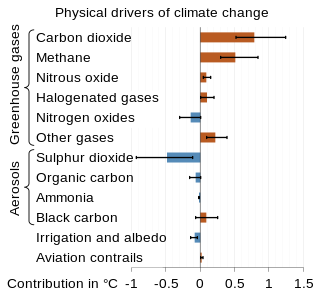Related Research Articles

The scientific community has been investigating the causes of climate change for decades. After thousands of studies, it came to a consensus, where it is "unequivocal that human influence has warmed the atmosphere, ocean and land since pre-industrial times." This consensus is supported by around 200 scientific organizations worldwide, The dominant role in this climate change has been played by the direct emissions of carbon dioxide from the burning of fossil fuels. Indirect CO2 emissions from land use change, and the emissions of methane, nitrous oxide and other greenhouse gases play major supporting roles.

Benjamin David Santer was a climate researcher at Lawrence Livermore National Laboratory and former researcher at the University of East Anglia's Climatic Research Unit. He retired from the Lawrence Livermore National Laboratory in 2021 and is now a Distinguished Scholar in Residence at Woods Hole Oceanographic Institution. He also worked at the Max Planck Institute for Meteorology from 1987 to 1992. He specializes mainly in statistical analysis of climate data sets, and detection/attribution of climate change forcings.

Global warming potential (GWP) is an index to measure how much infrared thermal radiation a greenhouse gas would absorb over a given time frame after it has been added to the atmosphere. The GWP makes different greenhouse gases comparable with regard to their "effectiveness in causing radiative forcing". It is expressed as a multiple of the radiation that would be absorbed by the same mass of added carbon dioxide, which is taken as a reference gas. Therefore, the GWP has a value of 1 for CO2. For other gases it depends on how strongly the gas absorbs infrared thermal radiation, how quickly the gas leaves the atmosphere, and the time frame being considered.
Lawrence Livermore National Laboratory (LLNL) is a federally funded research and development center in Livermore, California, United States. Originally established in 1952, the laboratory now is sponsored by the United States Department of Energy and administered privately by Lawrence Livermore National Security, LLC.

Global cooling was a conjecture, especially during the 1970s, of imminent cooling of the Earth culminating in a period of extensive glaciation, due to the cooling effects of aerosols or orbital forcing. Some press reports in the 1970s speculated about continued cooling; these did not accurately reflect the scientific literature of the time, which was generally more concerned with warming from an enhanced greenhouse effect.
The National Climate Assessment (NCA) is an initiative within the U.S. federal government focused on climate change science, formed under the auspices of the Global Change Research Act of 1990.

The IPCC Third Assessment Report (TAR), Climate Change 2001, is an assessment of available scientific and socio-economic information on climate change by the IPCC. Statements of the IPCC or information from the TAR were often used as a reference showing a scientific consensus on the subject of global warming. The Third Assessment Report (TAR) was completed in 2001 and consists of four reports, three of them from its Working Groups: Working Group I: The Scientific Basis; Working Group II: Impacts, Adaptation and Vulnerability; Working Group III: Mitigation; Synthesis Report. A number of the TAR's conclusions are given quantitative estimates of how probable it is that they are correct, e.g., greater than 66% probability of being correct. These are "Bayesian" probabilities, which are based on an expert assessment of all the available evidence.
In climatology, the Coupled Model Intercomparison Project (CMIP) is a collaborative framework designed to improve knowledge of climate change. It was organized in 1995 by the Working Group on Coupled Modelling (WGCM) of the World Climate Research Programme (WCRP). It is developed in phases to foster the climate model improvements but also to support national and international assessments of climate change. A related project is the Atmospheric Model Intercomparison Project (AMIP) for global coupled ocean-atmosphere general circulation models (GCMs).

Effects of climate change are well documented and growing for Earth's natural environment and human societies. Changes to the climate system include an overall warming trend, changes to precipitation patterns, and more extreme weather. As the climate changes it impacts the natural environment with effects such as more intense forest fires, thawing permafrost, and desertification. These changes impact ecosystems and societies, and can become irreversible once tipping points are crossed.
The Climate Change Science Program (CCSP) was the program responsible for coordinating and integrating research on global warming by U.S. government agencies from February 2002 to June 2009. Toward the end of that period, CCSP issued 21 separate climate assessment reports that addressed climate observations, changes in the atmosphere, expected climate change, impacts and adaptation, and risk management issues. Shortly after President Obama took office, the program's name was changed to U.S. Global Change Research Program (USGCRP) which was also the program's name before 2002. Nevertheless, the Obama Administration generally embraced the CCSP products as sound science providing a basis for climate policy. Because those reports were mostly issued after the Fourth Assessment Report of the Intergovernmental Panel on Climate Change (IPCC), and in some cases focused specifically on the United States, they were generally viewed within the United States as having an importance and scientific credibility comparable to the IPCC assessments for the first few years of the Obama Administration.
Michael Oppenheimer is the Albert G. Milbank Professor of Geosciences and International Affairs in the Princeton School of Public and International Affairs, the Department of Geosciences, and the High Meadows Environmental Institute at Princeton University. He is the director of the Center for Policy Research on Energy and the Environment (C-PREE) at the Princeton School of Public and International Affairs and Faculty Associate of the Atmospheric and Ocean Sciences Program and the Princeton Institute for International and Regional Studies.
Downscaling is any procedure to infer high-resolution information from low-resolution variables. This technique is based on dynamical or statistical approaches commonly used in several disciplines, especially meteorology, climatology and remote sensing. The term downscaling usually refers to an increase in spatial resolution, but it is often also used for temporal resolution. This is not to be confused with image downscaling which is a process of reducing an image from a higher resolution to a lower resolution.

Solar radiation modification (SRM), or solar geoengineering, is a type of climate engineering in which sunlight would be reflected back to outer space to offset human-caused climate change. There are multiple potential approaches, with stratospheric aerosol injection being the most-studied, followed by marine cloud brightening. SRM could be a temporary measure to limit climate-change impacts while greenhouse gas emissions are reduced and carbon dioxide is removed but would not be a substitute for reducing emissions.

Stratospheric aerosol injection is a proposed method of solar geoengineering to reduce global warming. This would introduce aerosols into the stratosphere to create a cooling effect via global dimming and increased albedo, which occurs naturally from volcanic winter. It appears that stratospheric aerosol injection, at a moderate intensity, could counter most changes to temperature and precipitation, take effect rapidly, have low direct implementation costs, and be reversible in its direct climatic effects. The Intergovernmental Panel on Climate Change concludes that it "is the most-researched [solar geoengineering] method that it could limit warming to below 1.5 °C (2.7 °F)." However, like other solar geoengineering approaches, stratospheric aerosol injection would do so imperfectly and other effects are possible, particularly if used in a suboptimal manner.
The United States Global Change Research Program (USGCRP) coordinates and integrates federal research on changes in the global environment and their implications for society. The program began as a presidential initiative in 1989 and was codified by Congress through the Global Change Research Act of 1990, which called for "a comprehensive and integrated United States research program which will assist the Nation and the world to understand, assess, predict, and respond to human-induced and natural processes of global change."
Lisa Dilling is an interdisciplinary scholar who focuses on the energy transition, climate adaptation, decision making, the use of information, and science policy. She aims to improve the effectiveness of policies for climate change. Dilling is Associate Chief Scientist at the Environmental Defense Fund, an environmental non-profit that works on climate change, clean air and public health, and supporting the ability of people and nature to thrive.
Fourth National Climate Assessment (NCA4) 2017/2018 is a 1,500 page two-part congressionally mandated report by the U.S. Global Change Research Program (USGCRP)—the first of its kind by the Trump administration, who released the report on November 23, 2018. The climate assessment process, with a report to be submitted to Congress every four years, is mandated by law through the Global Change Research Act of 1990. The report, which took two years to complete, is the fourth in a series of National Climate Assessments (NCA) which included NCA1 (2000), NCA2 (2009), and NCA3 (2014).
Climate change and agriculture are complexly related processes. In the United States, agriculture is the second largest emitter of greenhouse gases (GHG), behind the energy sector. Direct GHG emissions from the agricultural sector account for 8.4% of total U.S. emissions, but the loss of soil organic carbon through soil erosion indirectly contributes to emissions as well. While agriculture plays a role in propelling climate change, it is also affected by the direct and secondary consequences of climate change. USDA research indicates that these climatic changes will lead to a decline in yield and nutrient density in key crops, as well as decreased livestock productivity. Climate change poses unprecedented challenges to U.S. agriculture due to the sensitivity of agricultural productivity and costs to changing climate conditions. Rural communities dependent on agriculture are particularly vulnerable to climate change threats.
Maria Carmen de Mello Lemos is Professor of Environment and Sustainability and co-director of the Great Lakes Integrated Sciences and Assessments Center at the University of Michigan, Ann Arbor, and Senior Policy Scholar at the Udall Center for the Study of Public Policy at the University of Arizona. Lemos is an established climate policy analyst whose research focuses primarily on environmental public policymaking in Latin America and the US, especially related to climate change adaptation and adaptive capacity building.
References
- ↑ "Advisory Council". ncse.com. National Center for Science Education. Archived from the original on 2013-08-10. Retrieved 2018-10-30.